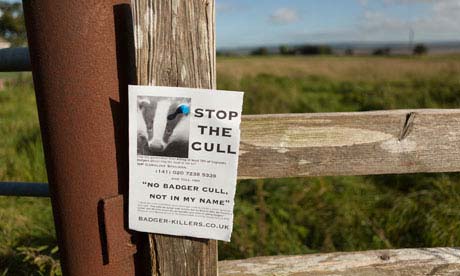
Photograph: Sam Frost for The Guardian
THE GUARDIAN
21 August 2013 by Damian Carrington
Controversial badger culls in England, aimed at curbing TB in cattle, expected to begin on 26 August
VIDEO HERE
People in west Somerset are directly affected by an imminent badger cull in England to curb the rise in tuberculosis in cattle. Many local residents in the cull-zone oppose the action and are doing all they can to help the animals survive. Yet most farmers believe a cull is the only way to safeguard their livelihoods. Patrick Barkham reports
England’s controversial badger culls are set to begin on the night of 26 August, the Guardian has learned.
The start of the shooting of badgers, aimed at curbing tuberculosis (TB) in cattle, will come after an injunction sought by the National Farmers’ Union to ban certain protesters from farmland is heard in the high court.
The intended start date was given to the Guardian by sources within the Department for Environment, Food and Rural Affairs (Defra) and elsewhere. The police are known to be preparing for the start date and cull opponents claim they have found new hair traps in the cull zones, which are used to estimate badger numbers ahead of the cull. A spokesman for Defra said: “The start dates are a matter for the culling companies.” The NFU, which represents the culling companies, declined to comment.
Rates of TB in cattle have increased significantly in recent years, with 28,000 cattle slaughtered in 2012 at a cost of £100m to taxpayers. Ministers and the NFU argue that culling badgers, which can transmit the disease, is a necessary part of action against the disease but eminent scientists have dismissed the culls as “mindless” and warn that they may make matters worse as badgers flee the shoots. The pilot culls in Gloucestershire and Somerset will see about 5,000 badgers killed if completed.
The NFU’s application for an injunction under the Protection from Harassment Act 1997 names some individuals and is due to be heard in court on Thursday. NFU president, Peter Kendall, said: “We have applied for the injunction in response to various incidents of harassment and intimidation carried out against farmers and landowners by activists opposed to the badger cull.”
But Dr Chris Cheeseman, a scientist who took part in a landmark 10-year trial of badger culling and had his car windscreen smashed during that time, said the injunction was a mistake. “It’s a pretty desperate measure,” he said. “The injunction has enraged people and could be counterproductive.”
The start of the badger cull, postponed from 2012, is expected to result in the largest animal rights protests since the ban on hunting foxes with dogs and to see many people protest in the cull zones.
In July, the Observer revealed that the government has refused to publish risk assessments of danger to the public during the night-time badger shoots because doing so “could have an adverse affect upon the health and safety of the public”. The police have previously warned of the “clear potential for harm to public safety” but the location and timing of the culls has been kept secret, which campaigners say puts those vaccinating badgers or patrolling for wounded animals at grave risk.
Cheeseman said: “I think it is likely the police will call a halt to the culls if they get nervous about public safety.”
Earlier in August, the prime minister, David Cameron, said culling badgers was “quite simply … the right thing to do”, without which there would be “appalling consequences not just for the cattle and the farmers [but] also for the badgers”.
However, Prof Rosie Woodroffe, at the Institute of Zoology in London and also part of the team that conducted the 10-year culling trial said: “Cattle TB is a major problem for farmers but despite the urgent need to act, evidence suggests that badger culling is not an effective solution. Scientists agree that culling is unlikely to have major benefits for cattle TB control and risks making matters worse, and Defra predicts that the costs will outweigh any financial benefits.”
Analysis of government data by Prof Woodroffe has shown that because of uncertainty over badger population numbers, shooters could kill every badger in the cull zones but still not have killed enough to meet the minimum number required by their licence.